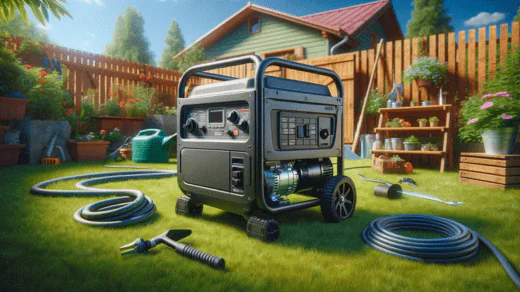The Ultimate Guide to Choosing the Best Portable Generator

Portable generators have become essential tools for a variety of applications, from providing emergency power during outages to supplying electricity for outdoor events and job sites. In this comprehensive guide, we will delve into the crucial aspects of selecting the best portable generator to suit your needs.
Understanding Portable Generators
Portable generators are versatile machines that convert mechanical energy into electrical energy, providing power when and where it is needed. They are commonly used in situations where a stable power supply is unavailable.
Key Features to Consider
1. Power Output
The power output of a portable generator, measured in watts, determines the number of devices it can support simultaneously. Consider both the starting (surge) wattage and running wattage. Ensure the generator can handle the initial power surge required by devices like refrigerators and air conditioners.
2. Fuel Type
Portable generators typically run on gasoline, propane, or diesel. Each fuel type has its advantages:
- Gasoline: Widely available and convenient but has a shorter shelf life.
- Propane: Burns cleaner and has a longer shelf life but may require more storage space for tanks.
- Diesel: More fuel-efficient and longer-lasting but can be noisier and more expensive.
3. Runtime and Fuel Tank Capacity
Consider how long the generator can run on a full tank of fuel. This is crucial for extended power outages or long events. Larger tanks provide longer runtimes but may increase the generator’s overall weight.
4. Portability and Size
The ease of transporting the generator is a critical factor. Look for features such as wheels, handles, and compact designs. Ensure the generator is light enough to be moved by the intended users.
5. Noise Level
Generators can be noisy, which might be a concern in residential areas or quiet environments. Check the decibel (dB) rating and opt for generators with noise-reduction features or inverter technology, which typically runs quieter.
Advanced Features
1. Inverter Technology
Inverter generators produce clean and stable power suitable for sensitive electronics like laptops and medical devices. They are generally quieter and more fuel-efficient but may come at a higher price point.
2. Multiple Outlets
Having various types of outlets (e.g., standard 120V, 240V, USB) increases the generator’s versatility, allowing you to power multiple devices simultaneously.
3. Automatic Start
Some generators feature an automatic start function that turns the generator on in the event of a power outage. This is particularly useful for ensuring continuous power to critical devices.
4. Parallel Capability
For users needing more power, some generators can be connected in parallel to double the output. This feature is beneficial for larger applications without needing a single, larger generator.
Maintenance and Safety Tips
1. Regular Maintenance
Performing regular maintenance, such as changing the oil, cleaning air filters, and inspecting spark plugs, ensures the generator runs efficiently and prolongs its lifespan.
2. Safe Operation
Always operate the generator in a well-ventilated area to prevent carbon monoxide buildup. Use appropriate extension cords and avoid overloading the generator to prevent electrical hazards.
Top Portable Generator Recommendations
- Honda EU2200i: Known for its reliability and quiet operation, suitable for sensitive electronics.
- Champion 3800-Watt Dual Fuel: Versatile with dual fuel capability, providing flexibility in fuel choice.
- Westinghouse WGen7500: High power output with a remote start, ideal for home backup power.
- WEN 56200i: Lightweight and compact, perfect for camping and tailgating.
- DuroMax XP12000EH: Heavy-duty with dual fuel options, suitable for large power needs.
Conclusion
Selecting the right portable generator requires careful consideration of your power needs, fuel preferences, and additional features that enhance usability and safety. By understanding these factors, you can make an informed decision that ensures reliable power whenever and wherever it is needed.




